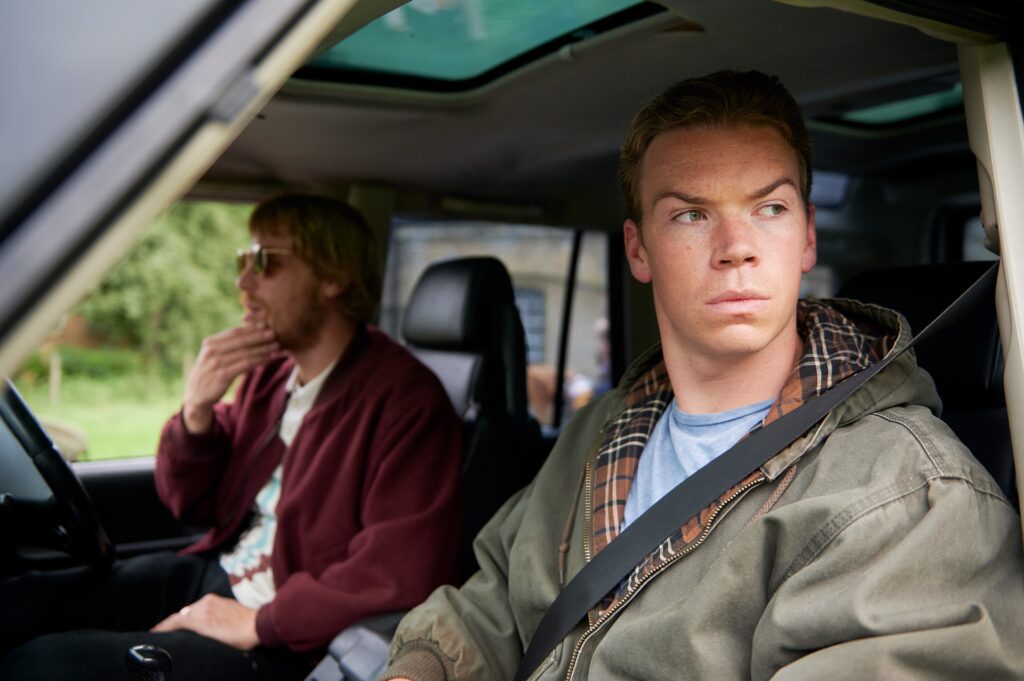OK, so things don’t really vanish anymore: even the most limited film release will (most likely, eventually) find its way onto some streaming service or into some DVD bargain bin assuming that those still exist by the time this sentence finishes. In other words, while the title of In Review Online’s monthly feature devoted to current domestic and international arthouse releases in theaters will hopefully bring attention to a deeply underrated (even by us) Kiyoshi Kurosawa film, it isn’t a perfect title. Nevertheless, it’s always a good idea to catch-up with films before some… other things happen.
Cryo
Barrett Burgin’s Cryo opens with video footage, seductively tinctured in ruby red, of an old man recording what might be a valediction to his time in this world. “Do you know the first Bible story I heard as a boy? Lazarus — raised from the dead.” Naturally, this foreshadows and foregrounds what is to come: the farewell enunciated in these brief seconds ominously implies a return sometime ahead, either of the past into the future, or of the future into the past. Thus emerge five individuals, seemingly unrelated, out of cold deep sleep and into an underground facility of sorts. The setting is discernible, and the suspense distinct enough: having lost their memories, but recalling vaguely their participation in a cryonic experiment designed to push the limits of human preservation, the five of them — soon segmented into their (presumed) roles hitherto: an engineer, a doctor, a soldier, a biologist, and a psychologist — fight to comprehend the mystery of their predicament and their way forward, all while suspicious happenings transpire and the crew are picked off one by one.
What follows can be justifiably categorized as a curious amalgam of conceptual precocity and practical insufferability; Cryo, for all its apparent fixation on the eponymous technology, neglects the flesh beneath the frozen top. Structured inconsistently as a study of group paranoia at one moment and a thesis on scientific hubris in another, its core chassis recalls the many cultural predecessors it swipes copious DNA from — Alien, The Thing, and, given several unfortunate though likely unintended allusions to circuits and currents, the endlessly parodied gameplay of Among Us. Yet despite these knowing markers, Burgin’s setup and execution are, in their various moments, missing continuity and creativity. The suspicions among the five ragtag clichés (smart enough to be selected for cryo-preservation but too stupid to distinguish between psychology and “psychoanalysis”) are drawn out for close to the film’s entire runtime, while — conversely — quite a few chunks of Cryo resemble decent student-film excerpts rather than an organically synthesized whole. (Sure, it’s Burgin’s directorial debut and the feature was developed out of thesis-film fodder, but still…)
Credit should be given to the film’s production value, which, all things considered, actually hits the mark (somewhat) as a decent exposition of the genre’s constant anxieties: hallucinations, uncharted waters, the irreducible gap between scientific proof and philosophical skepticism, etc. As mentioned, were Cryo a whole half-truncated, or composed of discrete shorts each thematizing interrelated concepts of yore and forevermore, the outcome would be much more striking and perhaps even novel. It’s a bit of a waste, really, because this is a film whose teleology obviously doesn’t spell “Cable Cuts” or, more aptly, “Leftovers: Thaw Before Heating.” Sadly, even “precocious” undermines itself, evincing the film’s inherent immaturity; chock full of religious tidbits unabashedly sprinkled, and culminating in an inexplicable plot twist that can only be said to have conjured two immediate thoughts — cheap mise en abyme and the “Do You Know Who Else Suffers From Dementia?” meme — in this viewer’s head, Cryo doesn’t live up to its opening first minute, if it can be said to live at all. Where futurist narratives tend to transplant age-old specters into the distant, tech-enhanced time beyond today, this one cloaks the exhilarating promises and perils of the future in a calcified slab of ice.
Writer: Morris Yang
Press Play
Romantic drama Press Play inadvertently stumbled into a bit of good luck thanks to the two-year delay of monster blockbuster Top Gun: Maverick, which features leading man Lewis Pullman in the role of the dorky-but-loveable Lt. Robert Floyd, AKA Bob. Without his presence, it’s safe to assume that not a single person over the age of 12 would even give Press Play a passing glance, its story of eternal love through the lens of time travel so trite and banal that it could almost play as satire. Clara Rugaard stars as Laura, a twenty-something artist spending the summer in Hawaii with best friend Chloe (Lyrica Okano). At Chloe’s urging, Laura agrees to meet her friend’s stepbrother, the dorky-but-loveable Harrison (Pullman), who works at a local record store. Sparks instantly ignite, and it isn’t long before the two are inseparable, she showing off her paintings that register roughly at the level of airport terminal art, he explaining his love of vinyl and cassette tapes over digital streaming (“You have to flip it over. It’s interactive.” That no mention is even made of sound quality only proves the stupidity of Harrison’s hipster line of reasoning.)
Unfortunately, Harrison is soon killed in a freak accident, leaving Laura to abandon her love of painting insipid beach scenes and devoting all of her time to surfing, which her former paramour adored. Laura is so distraught that, even four years later, she is unable to maintain a steady relationship and shows up late to Chloe’s wedding, in which she is a bridesmaid. It’s at said wedding that Laura is given a special gift by Harrison’s former boss and friend, Cooper (Danny Glover?!): of course, it’s a mixtape that Harrison had made for her and which includes a handful of songs that played during key moments in their relationship. Strike that — the only moments in their relationship, because this film fast-forwards through their dating to a degree that makes it impossible to determine just how long they were together. (Were one to guess, it seemed to be somewhere in the ballpark of two weeks, which makes Laura’s proceeding withdrawal from life quite psychologically unsettling.) And so, Laura plays the mixtape, and wouldn’t you know it, she is literally transported back in time to these specific moments, getting another chance to experience love again. You see, music can be transportive, and in Press Play, that quality is literal!
But instead of savoring these times with her long-lost love, Laura becomes obsessed with trying to save Harrison, convincing him of her knowledge because she accurately predicts an earthquake they shared together. But Laura only has the timespan of a handful of songs in order to rescue Harrison, because the doofus only made a Side A, and the end of each tune transports her back to the present day, where she soon discovers her actions in the past have consequences, including her friend marrying a completely different guy who is quite possibly abusive. It takes Laura forever to figure out the film’s moral — that most people are only given one chance to experience love, and so she should appreciate these moments she has instead of, you know, scaring Harrison into believing that his every ensuing action will result in his death. As it turns out, saving Harrison isn’t as easy as it seems; almost as impossible as letting go of a loved one.
Press Play desperately wants to be the 21st century’s answer to The Time Machine by way of The Notebook — wait, wasn’t that The Time Traveler’s Wife? — but devotes only a handful of moments to the romance itself, rendering the proceedings completely without either heart or driving force. Laura is a wet blanket who sulks her way through the entire movie, while Pullman is asked to play merely confused for the majority of it, dampening his natural charisma in the process. Director/co-writer Greg Björkman certainly takes advantage of his breathtaking Hawaiian landscapes, but, unfortunately, the imagery is oftentimes so flat that it begins to resemble one of Laura’s bogus paintings, which theoretically could have been an intentional choice, but we have to hope not. And for a movie ostensibly driven by music, the song choices are thoroughly weak, a lot of shoegaze-y indie rock by the likes of Japanese Breakfast, Dayglow, and Slowdive that even Siri has a hard time recognizing. Obviously, these selections were certainly made according to budgetary concerns, but they’re nonetheless pretty symptomatic of everything wrong with Press Play, the type of film for which the Stop button was practically invented.
Writer: Steven Warner
WYRM
Expanding on the short film of the same name, Christopher Winterbauer’s Wyrm tells the story of a kid who is very aware of how quickly he is falling behind his peers. Wyrm (Theo Taplitz) is about to fail his Level One sexuality requirement — kissing — and be held back a grade, unlike his twin sister Myrcella (Azure Brandi), whose recent trip to third base has marked her as well on her way to womanhood. The pair’s shared life begins to diverge, fractured by the absence of their parents, the death of their older brother Dylan (Lukas Gage), and wildly different social circumstances.
The world may be a gonzo version of our own, where a “No Child Left Alone” policy ensures that romantic/sexual milestones are met as a matter of policy, but all the emotional beats — losing friends, feeling out of place, learning truths about adulthood — tick all the expected boxes of a coming-of-age story. Where the film excels is in embracing its weirder, more surreal sketchings, particularly in the smaller details of its setting: Winterbauer draws a world with science-fiction elements that are deeply considered, its genre quirkiness never feeling gimmicky or over-the-top. His outlandish concepts are supported by an underlying emotional honesty that bolsters the film’s idiosyncrasies instead of allowing them to fall into the realm of pointless satirical whimsicality — the director earns his odd dystopia rather than allowing Wyrm to be carried on the back of a few sci-fi concepts. Equally weird is the film’s fantastic casting — it manages to pull off something of a reverse-Dear Evan Hansen, and instead of casting adults who look wildly out of place among children, casts actual teenagers who look eerily close to adulthood. Supported by costume design that often infantilizes, full of bright sweaters and braces, the cast of Wyrm look as disjointed and caught between modes of being as they feel. The deadpan performances add another element of discordance which, along with Winterbauer’s quietly bonkers world, establish an undeniable vein of absurdism that envisions a new (and probably accurate) perspective on youth.
But the strength of Wyrm’s conceptual vision and understanding of adolescence as a bizarre liminal space doesn’t quite extend throughout the whole film. Wyrm has a clear split in its narrative, shifting focus at the halfway point from its titular character’s romantic pursuits to his family’s grief for his older brother, and while the emotional climax does mostly work (especially in de-emphasizing romance as an important marker of coming of age), the two halves don’t entirely gel. Brandi particularly stands out in this second half as Wyrm’s twin sister, but this part of the film still feels somewhat weaker and less assured than its rock-solid first act. Still, Wyrm mostly lands on its feet, offering a sincere, surreal take on coming-of-age, even if it stumbles slightly while heading toward the finish line, and marks a solid debut feature from director Winterbauer.
Writer: Molly Adams
Dawn Breaks Behind the Eyes
Kevin Kopacka’s Dawn Breaks Behind the Eyes is a curious beast, a Peter Strickland-esque pastiche of low-budget ‘70s European horror movies — think Amicus more than Hammer — that switches gears so many times that it’s almost impossible to describe the plot without giving the whole thing away. Having said that, the movie ultimately fractures its own reality to such a degree that there’s less and less plot to synopsize, only psychedelic visuals and strange, ominous vibes. It begins simply enough; unhappily married Margot (Luisa Taraz) and her aggressively disagreeable husband Dieter (Frederik von Lüttichau) are traveling to a remote mansion in the dead of night. They’ve recently inherited it from a wealthy member of Margot’s extended family. Dieter is an emasculated prig, a leech with no money of his own who can’t wait to fix up and sell the place. But Margot feels drawn to it, as if it somehow has a power over her. As the pair investigate the property, Dieter comes across something terrifying in the basement (although the audience doesn’t see whatever it is) while Margot begins seeing spirits, ghostly specters that stir something within her. The mansion is a marvel of set design, an immaculate recreation of an old haunted house complete with cobwebs, ancient-looking fixtures, and willowy wisps of fog that creep about through windows and ominous doorways. The duo is forced to spend the night in the haunted abode, and an unsuccessful attempt at sex leads to a fight between the increasingly harried couple.
It all leads to a shockingly vile act of violence that is suddenly revealed to be part of a film shoot. Margot is actually an actress named Lilith, Dieter a friendly, jovial actor named Klaus. They’re both excited to be working with celebrated director Gregor (Jeff Wilbusch), who has assembled a small crew to film his ambitious project on a tight schedule and even tighter budget. His significant other, Eva (Anna Platen), is also his co-writer and some sort of line producer, and she’s unhappy about the film’s ending. It’s the last night of shooting in the mansion location, so the cast and crew decide to have an impromptu party; as the booze and drugs begin to flow freely, Margot/Lilith sets about seducing Gregor, while Eva grows increasingly angry that her ideas are being dismissed. Indeed, Eva and Gregor’s relationship begins to mirror that of the fictional Margot and Dieter, and it’s here that the already blurred line between fantasy and reality essentially disappears, narrative time looping back and folding in on itself. Eva and Gregor become the amorous spirits spotted by Margot/Lilith in the film-within-the-film, while the drug-fueled crew members engage in all manner of sexual escapades. Cinematographer Lukas Dolgner does a remarkable job capturing the shifting tones, from dark and gothic to brightly colored psychotronic, opaque reds and blues and greens overlapping and merging in a kaleidoscopic freak-out. It’s unclear what this all adds up to, if anything, but it’s a singular experience, moving beyond mere homage to become something weirder and more interesting as it culminates in an apocalyptic fury. It’s a wild ride for those willing to take it, and quite an announcement for director Kopacka.
Writer: Daniel Gorman
The Passenger
Those looking for a semi-woke update of the alien invasion flicks of yesteryear might be a little more forgiving of The Passenger, a Spanish horror flick that features a few gooey moments of impressive practical effects and capable filmmaking, and not much else. Blanco (Ramiro Blas) is a fifty-something former bullfighter who now spends his days shuttling various passengers around Spain as a rideshare driver. The love of his life is his minivan, a boxy white and brown relic from years past named Vanessa. She’s seen better days but can still get the job done in a pinch, proving that writers Javier Echaniz and Asier Guerricaechebarria at least have a baseline understanding of symbolism. It must also be stated upfront that Blanco is a misogynistic pig, the type of guy who casually drops the other hard F-word in normal conversation and thinks women should be seen and not heard. Indeed, he’s immediately called out on his sexist behavior by his latest clients, including no-nonsense nurse Mariela (Cecilia Suárez) and mother-and-daughter Lidia (Cristina Alcázar) and Marta (Paula Gallego). Blanco stares lasciviously at Marta from the moment of her arrival, even though the girl is 15 years old, tops. Mom is understandably appalled, but they need to get to the city in order to see Marta’s long-absent father, who is temporarily housing the girl due to a job opportunity too good for Lidia to pass up. Suffice it to say, tensions are high, and that’s before Blanco stumbles upon what appears to be the crash site of an alien spacecraft. In the midst of the ensuing chaos, Marta becomes infected by an alien parasite, while a comatose woman near the site — in fairness, comatose because Blanco inadvertently ran over her — wreaks havoc during an impromptu drive to the hospital. It isn’t long before Blanco and Marta are forced to team up to survive the night, stalked by a suddenly-infected Lidia, who has been gifted with superhuman speed and strength and seeming immortality.
There is something decidedly old school about The Passenger, playing a bit like a riff on the likes of Night of the Creeps. The pleasing practical effects are appropriately slimy, although they also serve to make the CGI used intermittently throughout even dodgier in comparison. Unfortunately, Blanco is quite the reprehensible human being, and the fact that the film keeps trying to paint both his age and upbringing as some sort of legitimate excuse for his behavior is a brassy, borderline offensive position to assume. At the same time, the film continues to call the character out on his rampant bullshit, but this mostly lands as a misguided attempt to both have cake and eat it. Indeed, the implication is made that Lidia is stalking Blanco because of his toxic ways, which is an interesting approach to take to the material, but it’s executed with such half-assed commitment that it never lands with the satirical touch that was obviously intended. There’s also a dangling plot thread about Lidia abandoning her daughter both literally and figuratively, and the subsequent repercussions, but that is discarded as quickly as it is introduced, its inclusion here cursory at best. Despite all that, directors Fernando González Gómez and Raúl Cerezo exhibit undeniable filmmaking chops throughout, even expertly utilizing split diopter for one particularly intense scene that would be sure to get the De Palma seal of approval. The film as a whole actually takes on a similar visual texture to those old B-movie chestnuts, a reverie for key camera placement in cramped quarters that also breeds ingenuity in crafting movement. And the directors get a lot of mileage out of a simple plastic divider that separates the vehicle’s front and back seating areas, utilizing in service of both comedy and to create key moments of tension. And this makes for the general crux of The Passenger: it’s the kind of film that inspires admiration in spurts but fails to ever encourage real investment from the viewer. It doesn’t help matters that the aliens are largely rendered as a riff on the zombies from 28 Days Later, their presence lending a tinge of nostalgia but nothing of novelty and imagination. Gómez and Cerezo clearly know their way around a camera, but they’ll need to find better passengers for their next journey.
Writer: Steven Warner
The Score
Based on the music of one of its stars, Johnny Flynn, Malachi Smyth‘s The Score follows career-criminals Mike and Troy (Flynn and Will Poulter, respectively) as they lay low at a roadside cafe, waiting for their handover contact. The setup is a fairly simple one: while they wait, Troy begins to fall for their waitress, Gloria (Naomi Ackie), and reconsiders the choices that led him here.
In terms of personal taste, even the most accessible of musicals has a pretty high barrier of entry for general audiences. Performers have to be doubly talented, and audiences often have to be given a solid reason for the project to take the form of a musical in the first place, given the recent mainstream cynicism for the genre. So while a jukebox musical is normally a safe bet, trading on the audience’s love of an artist to buy a bit of goodwill, Johnny Flynn’s music is not the most obvious choice. Full of grand metaphors and literary allusion but light on character or obvious narrative, Johnny Flynn’s music tends toward the distinctly poetic — which is to say, the music itself is good, but each time The Score indulges in a musical number, the film grinds to a halt. Flynn’s unique sound contributes a lot to the film’s tense atmosphere, and the numbers do a good job summarizing the film’s very obvious themes and communicating emotional beats that have already occurred in the spoken script, but rarely do they actually earn the time they occupy. As exceptional as it is, Flynn’s music wasn’t designed to convey plot or character, and it’s ultimately unable to take the strain of a conventional narrative.
Flynn is unfortunately among the project’s weaker points when it comes to his performance as well. His accent is patchy and often distracts, and while his musical talents are obvious, it’s not enough to gloss over the lesser aspects of his work here. Poulter and Ackie fare better, with the former’s trademark comedic timing and his surprising musical skill being one of The Score’s more redeeming qualities, and Ackie lending the film a grounding force that stops it from wandering too far into its own grandiose themes of tragedy. And while the pair’s chemistry isn’t anything for the history books, it never proves distancing, and both actors navigate their characters’ child-like bond with a sincerity that only underlines Flynn’s ominous lyrics. There might not be enough in The Score to recommend it on its own merits, but the component parts of the film show considerable promise, particularly in Poulter’s lead performance. But for those not sold on musicals in general or the music of Johnny Flynn specifically, Poulter and Ackie’s charm won’t be enough to convert many.
Writer: Molly Adams










